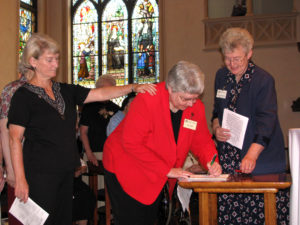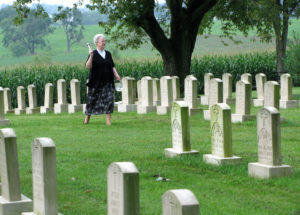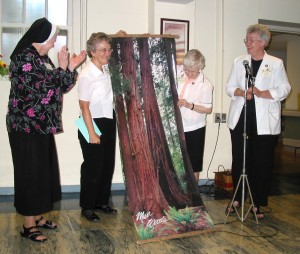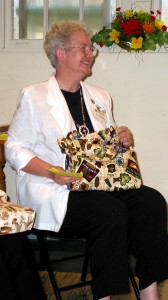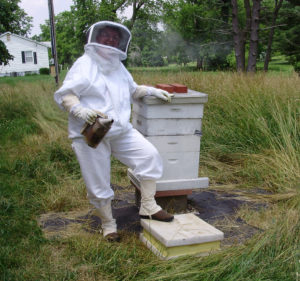(Sister Michele Morek left Brescia in December 2011 to become coalition coordinator for UNANIMA International, a nongovernmental organization of the United Nations. She served in that position until December 2016. From January 2017 to July 2023, she served as the North American liaison for the Global Sisters Report, a part of National Catholic Reporter, which is headquartered in Kansas City, Mo. She is now retired and discerning volunteer ministry in Kansas.)
Considering how much Ursuline Sister Michele Morek loves nature, she would think it an honor that her friend Sister Sharon Sullivan would describe her as an “otter.”
“In their natural element, otters are playful but industrious,” Sister Sharon said. “I believe the congregation of the Ursuline Sisters of Mount Saint Joseph is her natural element. She loves the world, loves creation, loves the cosmos in which she finds herself a guest of God. What drives her is that everyone else gets to share in it too. It is out of love.”
Sister Michele was a lifelong learner before that became a catchphrase, and takes great joy in passing on whatever knowledge she can.
“She can’t ‘not’ teach,” said Sister Cheryl Clemons, who ministered with her at Brescia University and during two terms in community leadership. “I loved traveling with Michele, she’d ask me some theological question, and I could ask her what flowers those were blooming along the road, and off we’d go,” Sister Cheryl said. “Even in an intense Council meeting, she would teach us something about the biological world.”
“Michele is a born teacher, full of curiosity and eager to share her discoveries,” said Sister Ruth Gehres, who ministered with Sister Michele at Brescia. “She’s great at that in the classroom, or at the dinner table. When we were working together at Brescia, some people squirmed at meal conversations about the sex life of sea urchins or other exotic information about God’s creatures. But most of us enjoyed the entertainment.”
After completing a six-year term as the congregational leader for the Ursuline Sisters in 2010, Sister Michele spent a year trying to discern her next ministry. She was led back to Brescia, a place where she has been connected for 43 years – first as a student, then as a professor, a dean, and most recently as a board member. The one role she hadn’t filled was staff member, but in July she began as director of Career Services and grants administrator.
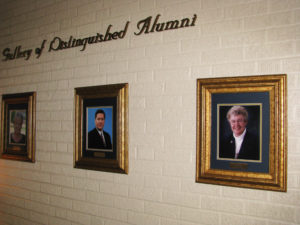
Sister Michele’s portrait hangs in the Brescia University Administration building in the Gallery of Distinguished Alumni. She was awarded that honor in spring 2011.
“I like being back,” she said. “I like working with this age group of people. I like being in a college atmosphere where you can go to a book club on your lunch time.”
When Father Larry Hostetter, Brescia president, asked her to talk to him before deciding on her next career move, he asked what she liked to do. She told him, “I really like to teach, but I knew I couldn’t be full time in a classroom again. I like to write, and I like to learn.” He suggested the career development and grant writing positions that were each part-time jobs that were open, so Sister Michele is fulfilling both roles, which report to different offices.
“Career development gets me in with the students,” Sister Michele said. “As soon as freshmen come in, I talk about building their resume based on what they do — the classes they take, the clubs they join, what they do in the summer,” she said. “I gave a class for seniors in the education department on interviewing. Job placement is part of it, alumni have been coming to me, some want help with resumes.
“The career piece feels like coming home. I always enjoyed helping students choose their major and talk about their career,” Sister Michele said. “I used to offer ‘What color is your parachute?’ classes during the summer for sisters in transition the first time I was on the (leadership) Council.”
James Fitzpatrick, dean of student development at Brescia, oversees career development, and said once he’d learned that Sister Michele had helped prepare other sisters for transition, he knew she could handle this role and would learn quickly.
“The traffic into that office has dramatically increased,” he said. “I know she’s been aggressive about meeting our students, that’s been fun to see.”
Fitzpatrick said it’s a bonus that Sister Michele already knows so many people at Brescia. “I feel like a talk show host saying, ‘Our next guest needs no introduction,’” he said.
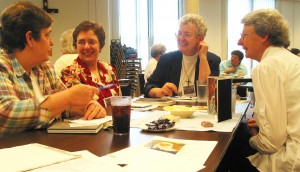
During a meeting at Maple Mount with the Ursuline Society in May 2008, Sister Michele visits with (from left) Sister Sue Bremer of Cleveland, Ohio, Sister Regina Rogers of Youngstown, Ohio, and Sister Patricia Homan, of Brown County, Ohio.
The grant writing portion of her job reports to the Office for Institutional Advancement, and involves “a bit of matchmaking,” finding out what foundations give money for what purpose and seeing how that matches the needs at Brescia. “I will interact with faculty and staff, write down their needs and wants, then go interview them,” Sister Michele said.
“I love to learn, this is a big learning curve,” she said. “I gave my first PowerPoint. I’m learning software and networking with other professionals on list serves. There’s a whole world out there.”
Her spacious office is behind the conference room on the second floor of the Student Center, and she’s added various animal touches since she began, including her sleeping elephant that a sister gave her.
“I feel welcomed back to Brescia. They treat me sort of like a mascot,” she said. “They were glad to have me back whatever I was doing.”
She was named a distinguished alumna of Brescia earlier this year, but said so far it hasn’t been odd ministering in a place where her picture hangs on the wall. “I don’t pass by the alumni wall, I never think about it,” she said. “I doubt if the kids even know that connection.”
Sister Michele, right, smiles as Sister Pat Lynch signs the Book of the Company and Sister Pam Mueller supports her during the July 2009 Mass celebrating the merger of the Ursuline Sisters of Paola, Kan., and the Ursuline Sisters of Mount Saint Joseph.
From January until May, Sister Michele had the opportunity to intern with UNANIMA, a nongovernmental agency of the United Nations of which the Ursuline Sisters belong, working on clean water issues.
“Being at the United Nations in New York really helped me to decide what I wanted to do next,” Sister Michele said. “Someone asked if I were going to stay in New York and work for the U.N. I realized the best thing I could do is go back home and keep an eye on my own country. I was concerned with the many stances the United States took, and the way they interacted and didn’t interact with the U.N.”
She said there was pressure to find the “perfect job” during her transition year – but she had a revelation. “Maybe the important things you do with your life are not what you do for a living, but what you do in between.”
A wandering spirit
Sister Michele has ministered in Daviess County, Ky., home of the Ursuline Motherhouse, for 40 years, which is a stark difference from her childhood, when her family moved often from state to state.
“I always say I’m from New Mexico, even though I only lived there 13 years,” Sister Michele said. “My spirit was formed in New Mexico, the great outdoors. When people ask where you’re from, I think they mean, ‘Where would you like to be?’”
She was born in Brownsville, Texas, baptized in Roosevelt, N.Y., and confirmed in Albuquerque, N.M., while also having stints in Mississippi and Florida.
“I was baptized three times. My daddy was Russian Orthodox, my mother was a converted Catholic,” Sister Michele said. “He wanted me baptized in the Russian Orthodox Church and there wasn’t one nearby, so I was baptized in an Episcopalian church. My mother started to worry about that, so she baptized me herself. Then she started worrying about that, so I was baptized in a Catholic church (in New York.)”
Sister Michele blesses the cemetery with holy water on Aug. 5, 2009. Each year on Aug. 5, the Feast of Our Lady of the Snows, the Ursuline Sisters of Mount Saint Joseph process to the cemetery to honor the dead.
“My daddy was from Brooklyn, N.Y. His parents came from Middle Europe after World War I,” she said. Michael Morek was in the Army Air Corps during World War II, stationed in Florida, and met Sister Michele’s mother, Blanche, in Miami Beach. The west Texas native was working for the U.S. Office of Censorship translating letters in Spanish and Portuguese.
“I was born in Brownsville, Texas, because Daddy was stationed there. They moved to Greenwood, Miss., but my mother hated the racism there,” Sister Michele said. From there they moved to New York, (where her father’s family lived) and then Clearwater, Fla.”
“I was named after him,” Sister Michele said. “They couldn’t decide whether to name me Michaela or Michele, so they called me ‘GI’ for the first year of my life.”
Before her second birthday, Sister Michele’s father was killed in a vehicle accident while serving near Naples, Italy.
“I have no memory of my father,” she said. “My first memory is my mother putting me in nursery school because she had to get a job, and I was so anxious.”
When she was 3, she and her mother were living in Florida when Sister Michele contracted tonsillitis. “The doctor said he could take my tonsils out or we could move to a dryer climate,” Sister Michele said. “My mother decided to move.” Her life in the Land of Enchantment was about to begin.
New Mexico
Her aunt and uncle owned a cattle ranch in New Mexico, and her aunt was an archaeologist. “She loved flowers and taught me how to identify them,” Sister Michele said. (Sister Michele can identify every type of tree on the Maple Mount campus.) “Two of my uncles were rock hounds, they loved to collect rocks. They called me their little pebble pup,” she said. “I loved being outside. My aunt would try to keep me inside to learn to sew and cook, but I wanted to be in the corral, or riding the horses.”
When Sister Michele was in the first through third grades, her mother attended pharmacy school, because she thought being a pharmacist was a good job for a single parent. “I’d draw bacteria in her books, go to the lab with her and see the rabbits,” she said. “The funny thing is, she never liked pharmacy.”
Blanche Morek’s love was working as a social worker on a Navajo reservation. “We lived in Albuquerque while my mother was in school, then we moved to Gallup (along the Arizona border) so she could be a social worker to earn enough money to go back to school,” Sister Michele said. “I loved to go with her. I loved growing up with the Navajos. I loved the diversity of New Mexico, the Indians, the Hispanics. When I came to Kentucky, everyone looked the same.”
Moving was never an ordeal for Sister Michele, she grew used to it. “I lived all over the state. All my mother’s family was from west Texas. They think if you’re good, when you die, you’ll go to New Mexico.”
Meeting the Ursulines
“We were living in Gallup, I was in the fourth or fifth grade, and I was becoming a juvenile delinquent,” Sister Michele said. “My mother said, ‘We are moving to where you can be in a Catholic school. There’s an Ursuline school in Farmington, they’re supposed to be very good teachers.’”
They moved to Farmington, in northern New Mexico, when Sister Michele was in the sixth grade, where she attended St. Thomas School.
The first Ursuline Sister she met at St. Thomas was her choir teacher, Sister Fran Wilhelm. “I loved her, she was young and energetic,” Sister Michele said. Sister Fran continues to minister to Hispanics in Owensboro, Ky., with Centro Latino.
“I had her in choir, she sang alto,” Sister Fran said. “The fact that she lives life to the fullest, you always know Michele is in the group.” When Sister Michele later decided to join the Ursulines, Sister Fran said she was thrilled.
“She has that zest for life that makes her effective in whatever she does,” Sister Fran said.
Another transition in Sister Michele’s life occurred when she was 11, when her mother married Theodore Kerkelis, who owned a restaurant where she went on her coffee break.
“He was a wonderful cook and my mother hated to cook,” she said. “I was mostly glad, I knew she had been lonely. Later we fought a lot, he wasn’t used to kids, and I wasn’t used to sharing my mother.”
When Sister Michele was 13, her brother Ted was born, and 10 months later, Mike was born. Mike Kerkelis lives in Thailand and Ted Kerkelis lives in San Diego. They came to visit her in September at the Mount. “I hadn’t seen Teddy in six or seven years, and I hadn’t seen Mike for 10 years, when I went to Thailand,” she said.
After St. Thomas, Sister Michele attended Waterflow Academy, a boarding school near Farmington, for high school. “Sister Consolata (Stallings) was my favorite teacher, she was my science teacher,” Sister Michele said. “It was the first time I’d had science.”
Hearing the call
In the 8th grade, a Victory Knoll sister talked to the class about vocations,” Sister Michele said. “I was angry. I said, ‘Everyone is going to be a sister except me.’

Sister Michele, left, and Sister Suzanne Sims, right, participate in the 2006 rally to close the School of the Americas in Fort Benning, Ga.
“When I was a junior, I started thinking about joining the Ursulines,” she said. “I really enjoyed the sisters, and I saw how much they enjoyed each other. Being in a boarding school lets you see them better.”
Her only trip to Kentucky prior to entering the convent was during her junior year of high school, when she and Sister Sara Marie Gomez made a trip to Washington, D.C., and were allowed to stop at the Mount to see a sister from New Mexico take the habit.
“We really didn’t like it at all,” Sister Michele said. “My hair curled, her hair went straight. We thought, ‘What kind of place is this?’”
There was not a particular moment when Sister Michele knew she was joining the Ursulines. “Sara Marie and I had to clean Father’s house and we hated it,” she said. “I told her I was going to join the convent, and she said she had been thinking about it too.”
Sister Sara Marie, who ministers in New Mexico, said Sister Michele’s personality hasn’t changed much since she met her as a sophomore in high school. “She’s always been very friendly, very accepting of people where they are,” she said. “She doesn’t follow the pattern, she’s her own person. She’s very staunch in what she believes in.”
On Sept. 7, 1961 (50 years ago last month), she, Sister Sara Marie, Sister Sheila Anne Smith, and Toris Yeager, who later left the community, all entered as postulants. “It was the only time in the history of the community that they had four from New Mexico enter. We were a marvel.”
There were 18 in her novice class, and six remain in the community today, Sisters Sara Marie, Sheila Anne, Rose Jean Powers, Francis Joseph Porter and Kathy Stein. “I really enjoyed the novitiate,” Sister Michele said. “I enjoyed having all these sisters.”
The difficult part for her was leaving behind her younger brothers, who were 3 and 4 at the time. “I’d held up well until we got to the bus station, then I started to cry,” Sister Michele said. “They had never seen me cry, so they said, ‘Mickey, you’re funny.’” Her brothers still call her Mickey.
Sister Rose Jean, who ministers at Brescia, recalls Sister Michele as fun-loving and mischievous from their novitiate days. “She was always interested in what made a thing work, not just in nature, but everything,” Sister Rose Jean said. “She always wanted someone to go with her on a walk, because she was always looking down examining the bugs or moths, so someone had to watch where we were going.”
Sister Michele took the name Sister Dolores Marie. “Devotion to the Sorrowful Mother was very popular in New Mexico,” Sister Michele said, and the Spanish word for “sorrow” is “dolor.” “I kept it until I came back to teach at Brescia.”
A teacher is born
“I had never thought about being a teacher in high school, I wanted to be a scientist,” Sister Michele said. “Then I realized I could teach science.”
“When we made our vows and we started going into town to Brescia, they announced what we would major in,” Sister Michele said. “Sister Consolata (her former science teacher) was on the Council, she whispered that I would get to teach science.”
It didn’t take long to realize she loved teaching. “In the juniorate, I taught the postulants biology. I really loved it,” Sister Michele said. “That was half of my student teaching. I did the rest of my student teaching at (Owensboro) Catholic High, I taught 37 sophomore boys reproduction. My supervisor told me if I could teach that, I’d never have trouble teaching anything.”
She got her first teaching experience in the rural community of Knottsville, about 45 minutes from Maple Mount. “The only thing I was comfortable teaching was science and music – so I taught English,” she said. The next year she was sent to St. Margaret Mary Elementary School in Louisville to teach the final three weeks of school to 8th-graders. “Those kids ran all over me. It was awful,” she said. “The next year (1966-67) I taught the whole year there and it was fine. Science and music were the only subjects I didn’t teach.”
Joining the Irish
“The administration knew I was going to graduate school before they sent me to St. Margaret Mary,” Sister Michele said. “I was told I may as well take French, I would need that for my Ph.D.”
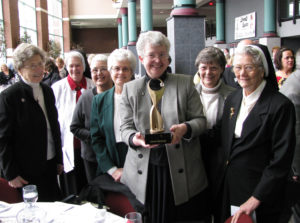
Sister Michele holds the Athena award that the Ursuline Sisters won in 2009, given to people or groups who help women attain their full potential. Also pictured, from left, are Sisters Annalita Lancaster, Rose Marita O’Bryan, Ann McGrew, Barbara Jean Head, Cheryl Clemons and Joseph Angela Boone.
She spent the year writing to graduate schools about financial aid, with the idea to pursue whichever school offered the best deal. “I got an acceptance letter from the head of the biology department at Notre Dame” saying that cost isn’t the best way to choose an education.
From 1967-71, she attended Notre Dame, skipping a master’s degree and working on her doctorate in developmental biology, which deals with embryology, genetics and cell biology. “It was an interesting time after Vatican II,” she said. “I lived in a dorm with 40 women religious from different communities, there were so many examples of faithful love. I made lifelong friends.”
One of those friends is Sister Victoria Marie Forde, a Sister of Charity of Cincinnati. “Michele was everyone’s friend, someone whose brilliance never got in the way of her outgoing personality, her friendliness to all, and her delightful sense of humor,” Sister Victoria Marie said.“No matter how pressured we were with papers due, oncoming exams, etc., Michele was upbeat and kept us all sane with her outlook of what was really important and normal. She was one of those who kept us ‘growing.’”
Sister Michele was impressed with the intellectual fervor that was going on, and the many resources from talented people. “I walked into one lab, there were bowls of tadpoles stacked up to the ceiling,” Sister Michele said. “When I heard they were doing cancer research, that’s where I wanted to be.”
During her years at Notre Dame, she had the opportunity to spend summers at the Woods Hole Oceanographic Institution in Massachusetts. “The two best summers of my life were when I went to Woods Hole and studied marine embryology,” she said. “They bring in animals, we’d extract eggs and sperm and recreate famous experiments. It was like someone brought you wonderful toys every day.”
Brescia
The joke among the Ursuline community was that “Ph.D.” stood for “poor home devil,” because once a sister earned one, she never left Brescia College, now University. But Sister Michele never wanted to leave.
She returned to Brescia in 1971 as an assistant professor of biology, just five years after graduating. “I loved it, I never looked back.”
She taught embryology, genetics, cytology, histology, ecology and comparative anatomy. “I started the marine biology and environmental science classes,” she said. “I loved teaching biology, I never wanted to do anything else. I would get ready for class some mornings and think, ‘They pay me to do this. I would pay to do this.’”
Among her former students was Sister Sharon, who was returning to school to get an education degree. “I had avoided biology my whole college career,” said Sister Sharon, who has now succeeded Sister Michele as congregational leader. “She made it lively. Even her tests were engaging. I lumped her in with the other Ursulines I met. She was one of the cool ones.”
In those early years at Brescia, Sister Michele and Sister Rose Jean lived together on campus and were devoted members of the “Cockroach Club,” so named because they came out after others went to sleep, Sister Rose Jean said. Other members were Sister Ruth, Sister Vivian Bowles, the late Sister Mary deChantal Whelan, and the late Sister Anne Louise Ramold.
“We stayed up to watch ‘Cell Block H’ and ‘Mary Hartman, Mary Hartman.’ We would be downstairs laughing up a storm and hoping we weren’t waking up the others,” Sister Rose Jean said. “Michele is the kind of person, whether it’s a meeting or a social get-together, she adds life to it.”
When Sister Rose Jean came to Maple Mount in 1984 to minister, Sister Sharon replaced her at Brescia and became a member of the Cockroach Club. “I had an operation my first year there, the get-well stuff that Michele sent me included an empty Scotch tape roll, with a note that said it was “a coliseum for microbial Olympics,’” Sister Sharon said. “I laughed until my stitches nearly burst.”
In 1979, Sister Ruth, who now ministers at Casa Ursulina in Chillan, Chile, and Sister Michele were among five Ursulines who were chosen to be part of a Friendship Force visit to Italy.
“For the six weeks after we were notified, I buried myself in trying to learn Italian,” Sister Ruth said. “Michele laughed and said: ‘Just make it up … the Italians will understand.’ So most of the time while I was trying to find the proper words, Michele was managing communication just fine with her smattering of New Mexico Spanish and sign language dramatizations. One of our visits was to a 400-year-old dairy farm that had modern milking machines,” Sister Ruth said. “As I was taking photos, I overheard Michele asking the padrone (owner) whether he used artificial insemination to propagate his herd. The padrone answered ‘Si.’ I thought, ‘Who needs to learn Italian?’”
Unconditional love
During Ursuline Community Days in 2010, Sister Ann Patrice Cecil, second from left, in honor of her 21 years of service to the leadership Council, received this picture of redwood trees, along with a plane ticket to Seattle to see the redwoods in person along with Sister Michele, right, and Sister Sharon Sullivan. The three have taken a camping trip together every year since 1994. Also pictured are Sister Rose Marita O’Bryan, left, and Sister Mary Irene Cecil, second from right.
Among the joy in Sister Michele’s early years at Brescia was the sadness that occurred in March 1975, when her mother died in a car accident in New Mexico at age 60. “I’d been going back to see her every year,” Sister Michele said. “I always thought the worst thing that could happen to you is if your mother died. Yet, here I am. This won’t kill you.”
Sister Michele had never been comfortable around grieving people, but her mother’s death taught her how, she said. “That’s my mother, still teaching me.”
“She would never let the sun go down on our anger. If we had a fight, she would always ask my pardon when she tucked me in,” Sister Michele said. “I always knew I had unconditional love. That has a lot to do with how much self-confidence you have. It illustrated the love of God.”
A new ministry
In 1980, Sister Michele was named academic dean and vice president of academic affairs at Brescia, the person who leads the faculty, develops programs and a myriad of other jobs.
“Sister George Ann (Cecil) was president of Brescia and told me a good administrator always takes the opportunity to go to the bathroom,” Sister Michele said, a reference to always being busy.
“It was OK, I didn’t feel passionate about it like teaching,” she said. “There were days when I enjoyed it, days when I didn’t. I don’t like to tell anyone bad news.”
When Sister George Ann died at an early age in 1985, Sister Michele agreed to stay on another year to help Sister Ruth when she was named president.
“From the beginning I knew I could count on her help when I asked,” Sister Ruth said. “I also knew that if I asked for her judgment about a decision, she wouldn’t pussy-foot around about it. I trusted her clear-sightedness, but more than that, I knew she would be honest, even if she had to tell me, flat-out, that she couldn’t agree with what I thought. All of this engendered a trusting attitude that helped us work things out together for the best result.”
Sister Michele returned to the classroom after stepping down as dean, and Sister Ruth remembers the dinner her housemates planned for her. “Sister de Chantal, cook extraordinaire, volunteered to cook whatever Michele requested,” Sister Ruth said. “Michele’s request: artichokes! None of us had ever eaten artichokes — probably few of us had even seen them. DC followed Michele’s directions for preparing these weird-looking vegetables, and before we began to eat, Michele gave us a detailed demonstration as to how to eat them. Thus began our hilarious – and delicious – dinner. There were other things on the menu, but we only remembered the artichokes.”
Sister Michele taught at Brescia until 2004, becoming a full professor in 1992. But she had to teach part time beginning that year because she was elected to her first of two four-year terms as a member of the leadership Council.
Leadership
“Everyone who goes into community leadership thinks you’re going to do all this wonderful stuff, like you’re Saint George on the horse, slaying dragons,” Sister Michele said. “You spend most of your time putting out fires.”
During her two terms, (1992-2000) she was in charge of the continuing education of the sisters, led the professional development committee, and offered programs for the sisters who came home during the summer.
Sister Michele smiles after receiving a purse made by Sister Mary Louise Knott depicting a wilderness adventure, during Community Days in 2010. The gift was in honor of her completing her term as congregational leader.
After returning to the classroom full time at Brescia from 2000-2004, which included being chairwoman of the Division of Math and Natural Sciences, Sister Michele was elected as congregational leader for the Ursuline Sisters. She was the first to serve a revamped single six-year term from 2004-1010.
“It’s affirming to be chosen to community leadership. We really want to be of service to our sisters, we love them,” Sister Michele said. “The best part was getting to know the sisters, visiting them to see ‘more and more the good you are doing.’ I got to develop a new kind of relationship with them.”
Sister Michele oversaw the mergers of the Ursuline Sisters of Belleville, Ill., and the Ursuline Sisters of Paola, Kan., with the Ursuline Sisters of Mount Saint Joseph. “One of the most satisfying experiences was those two mergers, because of the development of the relationships,” she said. “It was hard for them. I was doing what I could to facilitate making it a happy, joyful experience for them.”
Sister Cheryl, who was assistant congregational leader, said Sister Michele “always has a sense of humor, and presumes the best in people. She has an ability to look at any issue from many sides and remain objective. She tended to take people as they were, and accept them as they were at that moment.”
Sister Michele said what she learned most during her tenure is, “Just what an amazing group of women these are who I served. I never prayed with such depth of fervor. It forces you to your knees,” she said. “I found many uses for the God jar – you write down your problem on a piece of paper and say, ‘Here, You do it, I can’t do it.’”
One of her first satisfying moments in leadership was when a sister came to her needing help. “I realized I could make it happen without asking anyone else,” she said.
Free time
There’s always an adventure awaiting Sister Michele, whether it’s a trip far away or getting lost in one of three books she is reading.
“I like to take really long car trips,” she said. “I’ve been to all 50 states except North Dakota,” and she made a pact with Sister Dorothy Helbling, a North Dakota native, that the two would go. She has traveled to Australia, Italy, Thailand, Mexico and Canada, but also enjoys the camping trips she’s taken across the country with Sister Sharon and Sister Ann Patrice Cecil.
Protecting the environment is one of her passions, and she’s worked for more than 25 years with local clean water groups. She started by taking her students out to test water, and has continued the testing herself.
Sister Michele prepares to smoke her beehives on the Motherhouse grounds in June 2009.
In recent years, she’s also become a bee keeper. “I had always loved teaching about bee behavior. It’s fun to watch them, but it’s a lot of hard work,” Sister Michele said. “Now I feel obligated to them.”
She describes herself as an “omnivorous reader,” and enjoys mysteries, books about ancient civilizations, and authors who have a “fine sense of place.” “I read the early chapters of James Michener’s books,” she said. She cites Nevada Barr as an author with a great sense of place, and she’s also a fan of Tony Hillerman because she loves the stories of New Mexico.
While interning in New York City this year, she launched another adventure simultaneously, joining Sister Martha Keller as one of two sisters who blog for the Ursuline website.
“I enjoyed New York a lot more because I got to blog about it. I could see it through other people’s eyes,” she said. “As I continue blogging, it’s no longer to entertain, it’s a strange hybrid of a personal journal and a vocation page. I’m better at recounting stories, I’m not sure anyone enjoys my innermost thoughts.”
Sister Cheryl, now academic dean and vice president of academic affairs at Brescia, said people enjoy having Sister Michele around. “She doesn’t meet a stranger, and she loves students,” Sister Cheryl said. “She’s one of the most positive, optimistic people, and that’s contagious. People like being around her.”
Sister Michele isn’t sure what the next adventure will be for her. “I’ll have to wait and see what comes up,” she said. “I’ve always believed we have some job to do, and we won’t know what it is until after we’re dead.”
By Dan Heckel
